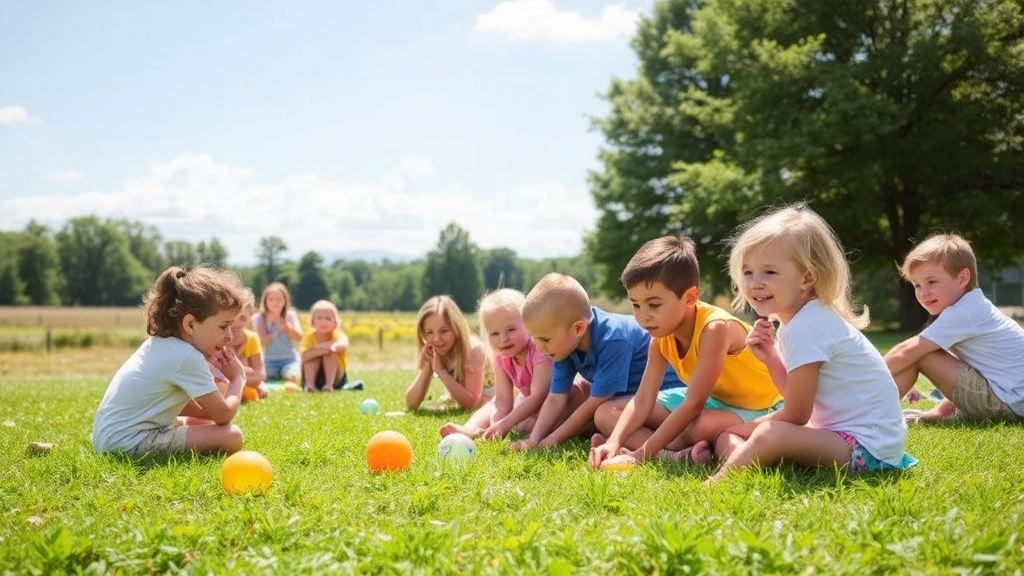Summer Camp Ideas and Activities
Ever wondered how to keep kids entertained, engaged, and learning all summer long? Look no further! Our comprehensive guide on summer camp ideas and activities is your ultimate resource. From creative arts and crafts projects to thrilling outdoor adventures, themed camp days, and team-building games, we’ve got it all covered. Dive into water-based fun, explore nature, conduct DIY science experiments, and enjoy campfire stories and songs. Plus, we’ve included sports, cultural workshops, and educational activities to ensure a well-rounded experience for every camper.
Join us as we explore a variety of activities that cater to different interests and skill levels, ensuring every child has a memorable and enriching summer. Whether you’re looking to foster creativity, boost teamwork, or simply have a blast, our guide offers practical tips, real-life examples, and safety advice to make your camp a hit. Get ready to create unforgettable memories and life-long friendships with our top-notch summer camp ideas and activities!
Creative Arts and Crafts Projects
Ever wondered how to keep kids engaged and off their screens? Creative arts and crafts projects might just be the answer. Whether you’re dealing with a rainy day at camp or looking for a way to channel some of that boundless energy into something productive, arts and crafts offer a fantastic outlet. Let’s dive into some ideas and tips that make this activity a hit.
Why Arts and Crafts?
Arts and crafts aren’t just about keeping kids busy; they’re about nurturing creativity, improving motor skills, and boosting self-esteem. Plus, who doesn’t love taking home a little memento of their time at camp?
Basic Supplies You’ll Need
Before we get into specific projects, let’s talk about what you’ll need. Here’s a quick list of basic supplies to keep on hand:
- Paper: Construction paper, cardstock, and plain white paper
- Paints: Watercolours, acrylics, and finger paints
- Markers and Crayons: A variety of colours
- Glue and Tape: Glue sticks, liquid glue, and masking tape
- Scissors: Safety scissors for younger kids
- Miscellaneous: Beads, buttons, fabric scraps, and googly eyes
Simple Projects to Get Started
- Friendship Bracelets: These are a classic camp activity. All you need is some colourful string or yarn. Kids can create their own designs and trade them with friends.
- Paper Plate Masks: With a few paper plates, some paint, and a bit of imagination, kids can create masks of their favourite animals or characters.
- Nature Collages: Take a walk outside and gather leaves, twigs, and flowers. Use these natural elements to create beautiful collages. This not only fosters creativity but also connects kids with nature.
Advanced Projects for Older Kids
- Tie-Dye T-Shirts: A bit messier but loads of fun. Use white t-shirts and fabric dye to create unique, wearable art. Make sure to have gloves and aprons handy!
- Clay Sculptures: Air-dry clay can be moulded into anything kids can imagine. Once dry, they can paint their creations.
- Canvas Painting: Provide small canvases and acrylic paints. Let kids explore their artistic side with more permanent creations.
Tips for Success
- Prepare in Advance: Have all materials ready before the activity starts. This keeps the flow smooth and the kids engaged.
- Set Up a Creative Space: Designate an area for arts and crafts. Cover tables with old newspapers or plastic sheets to make clean-up easier.
- Encourage Creativity: There’s no right or wrong in art. Encourage kids to express themselves freely.
Linking It All Together
Arts and crafts can be seamlessly integrated into other camp activities. For instance, after a nature hike, use collected items for collages. Or, tie-dye t-shirts can be part of a themed camp day. The possibilities are endless!
For more ideas on engaging camp activities, check out our fun summer camp crafts for kids and our indoor summer camp games for all ages.
Outdoor Adventure Activities
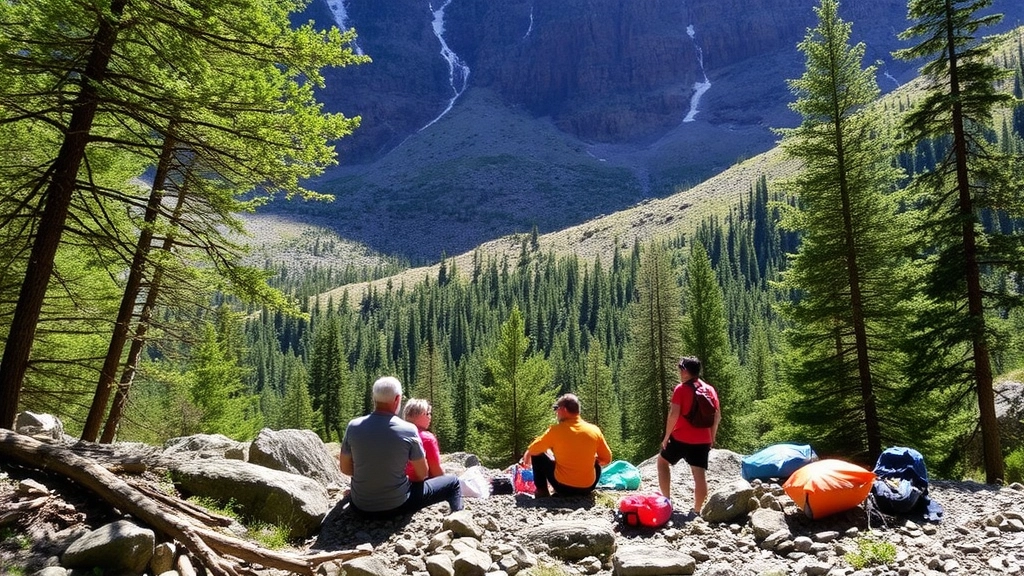
Ever wondered how to keep kids entertained and active outdoors?
Outdoor adventure activities are the answer.
They’re not just fun, they’re essential for growth and learning.
Why Outdoor Activities Matter
Kids today are glued to screens.
Getting them outside is a challenge.
But here’s why it’s worth it:
- Physical Health: Fresh air and exercise beat sitting indoors.
- Mental Health: Nature reduces stress.
- Social Skills: Teamwork and communication thrive outdoors.
Top Outdoor Adventure Activities
Let’s dive into some ideas.
1. Nature Scavenger Hunts
Kids love a good hunt.
Create a list of items for them to find:
- Leaves
- Rocks
- Bugs
It’s like a treasure hunt but educational.
2. Hiking and Trail Exploration
Simple, yet effective.
Find a local trail.
Pack some snacks.
And just walk.
3. Obstacle Courses
Set up a course using:
- Logs
- Ropes
- Hula hoops
Kids will love the challenge.
4. Camping Trips
Even if it’s just in the backyard.
Set up tents.
Roast marshmallows.
Tell stories.
5. Orienteering
Teach kids how to use a compass.
Set up checkpoints.
It’s like a real-life video game.
6. Rock Climbing
Find a safe spot.
Or visit an indoor climbing gym.
It’s great for building strength and confidence.
7. Canoeing or Kayaking
If you have access to water.
Teach kids the basics.
It’s a mix of fun and exercise.
8. Zip Lining
For the thrill-seekers.
Find a local zip line park.
It’s an adrenaline rush.
Safety First
Always keep safety in mind.
- Supervise activities.
- Use proper gear.
- Know the area.
Themed Camp Days and Events
Ever wondered how to keep the energy high and the excitement rolling at camp? Themed camp days and events are your answer. These days are like adding a turbo boost to your camp experience. Let’s break it down and see how you can make every day at camp feel like a new adventure.
Why Themed Camp Days Rock
First off, themed camp days are a game-changer. They break the monotony and keep everyone on their toes. Picture this: one day you’re a pirate hunting for treasure, and the next, you’re a superhero saving the day. It’s all about creating memories that stick.
But here’s the real kicker: themed days also build community. When everyone dresses up and gets into character, it levels the playing field. It doesn’t matter if you’re the shy kid or the camp leader; everyone’s in it together.
How to Plan Epic Themed Days
Planning themed camp days might sound like a Herculean task, but trust me, it’s simpler than you think. Here’s a quick roadmap:
- Pick a Theme: Choose something broad enough to include everyone but specific enough to be exciting. Think “Space Adventure,” “Wild West,” or “Under the Sea.”
- Prep Activities: Align your activities with the theme. For a “Space Adventure,” you could have a rocket-building contest or a moonwalk race.
- Costumes and Props: Encourage campers to dress up. Provide simple props like hats or masks to those who might not have a costume.
- Themed Meals: Go all out with the food. Serve “alien cupcakes” or “cowboy beans” to keep the theme alive even during mealtime.
- Wrap-Up Event: End the day with a big event â a talent show, a themed movie night, or even a treasure hunt.
Real-Life Examples
Let me share a couple of stories from my own camp days. One summer, we had a “Harry Potter Day.” Everyone was sorted into houses, we played Quidditch (well, our version of it), and even had a feast in the “Great Hall.” It was a blast, and years later, campers still talk about it.
Another time, we did a “Survivor Day.” We set up challenges inspired by the TV show, and campers had to work in tribes to complete them. It was intense, but it taught us all about teamwork and perseverance.
Pro Tips for Themed Days
Here are some quick tips to ensure your themed camp days are a hit:
- Get Everyone Involved: From the youngest camper to the oldest staff member, everyone should participate. It builds camaraderie.
- Keep It Simple: Not every activity needs to be elaborate. Sometimes, the simplest games are the most fun.
- Be Flexible: Things might not always go as planned, and that’s okay. Adapt and keep the fun rolling.
- Feedback Loop: After the event, get feedback from campers and staff. What worked? What didn’t? Use this info to make the next themed day even better.
For more ideas on keeping your camp exciting, check out our Top 10 Exciting Summer Camp Activities and get inspired by some Summer Camp Quotes to motivate your campers!
Team-Building Games and Challenges
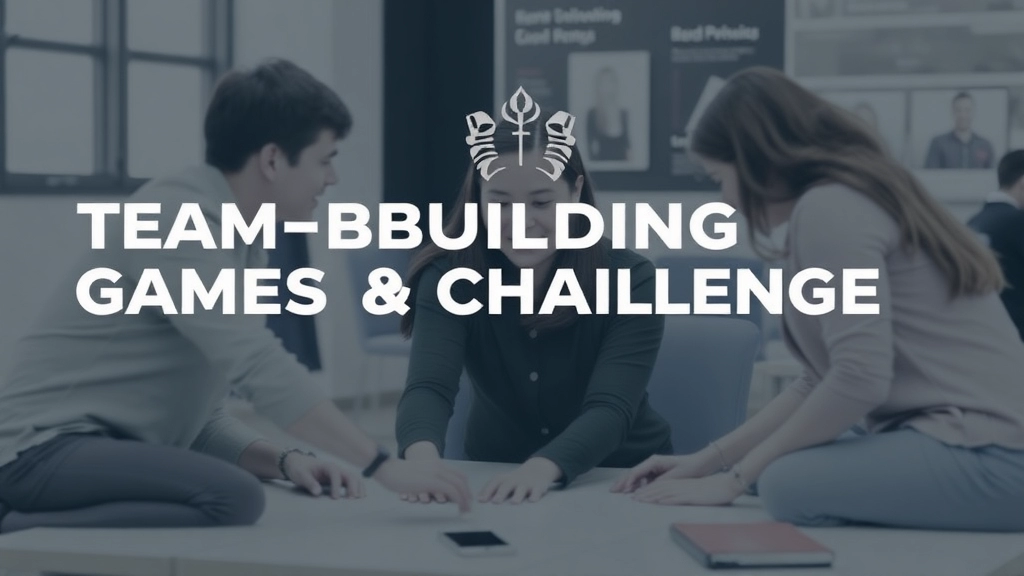
Ever wondered how to get a group of kids to work together without the usual bickering?
Team-building games and challenges are the answer.
These activities aren’t just fun; they’re essential for developing cooperation, communication, and trust among campers.
Why Team-Building Matters
Let’s face it, teamwork isn’t just a buzzword.
It’s a life skill.
When we throw kids into these games, they learn to:
- Communicate effectively
- Trust each other
- Solve problems together
And guess what? They have a blast doing it.
Popular Team-Building Activities
Here are some no-fail team-building games that always hit the mark:
1. Human Knot
- Everyone stands in a circle.
- Each person grabs two other hands, but not those of their immediate neighbours.
- The goal? Untangle the knot without letting go.
2. Trust Fall
- One camper stands with their back to a small group.
- On the count of three, they fall back, trusting the group to catch them.
3. Scavenger Hunt
- Split into teams.
- Give each team a list of items to find or tasks to complete.
- First team to finish wins.
Real Stories, Real Fun
Let me tell you about the time we did a scavenger hunt at our camp.
One team found an old, forgotten treehouse and turned it into their base.
They worked together, using a map and clues, and when they won, the look on their faces was pure gold.
Tips for Success
Want to make these activities even better?
Here are some quick tips:
- Mix up the teams: Don’t let cliques form.
- Keep it simple: Complicated rules can ruin the fun.
- Debrief after: Talk about what went well and what didn’t.
Water-Based Fun and Games
Alright, let’s dive right in. Water-based fun and games are an absolute must for any camp, especially when the sun’s blazing and everyone’s looking to cool off. But here’s the thing â it’s not just about splashing around. It’s about creating unforgettable moments, building skills, and having a blast. So, what can we do to make sure everyone has the best time?
Why Water-Based Activities?
First off, why should we even bother with water-based activities? Here’s the deal:
- Cooling Off: Obvious, right? But it’s more than just temperature. Water activities can be a lifesaver on a scorching day.
- Physical Exercise: Swimming, diving, and water games are excellent for keeping fit.
- Teamwork: Many water games require teamwork, which helps build camaraderie and communication skills.
- Fun Factor: Let’s face it, water activities are just plain fun. They break the monotony and keep the energy levels high.
Popular Water-Based Activities
Now, let’s get into the nitty-gritty. What are the best water-based activities that can keep everyone engaged and excited?
- Water Balloon Fights: Classic, right? But it never gets old. Split into teams, set some boundaries, and let the fun begin. It’s a great way to encourage teamwork and strategy.
- Slip ‘n Slide Races: Lay out a long plastic sheet, add some water and soap, and you’ve got yourself a high-speed race track. It’s simple, but it’s a hit every time.
- Kayaking and Canoeing: If you’ve got access to a lake or a calm river, these activities are fantastic. They’re not only fun but also teach balance and coordination.
- Water Relay Races: Set up a series of challenges that teams have to complete in water. It could be anything from swimming to fetching objects from the bottom of the pool.
- Paddle Boarding: This one’s great for balance and core strength. Plus, it’s a ton of fun trying to stay upright!
Safety First
Now, before we get too carried away, let’s talk about safety. Because, let’s be real, water activities can be risky if not managed properly.
- Lifeguards: Always have a qualified lifeguard on duty.
- Life Jackets: Ensure everyone wears life jackets, especially during kayaking or canoeing.
- Buddy System: No one goes in the water alone. Always have a buddy.
- First Aid: Have a first aid kit handy and know the basics of CPR.
Real Stories, Real Fun
Let me share a quick story. Last summer, we had a group of kids who were initially hesitant about getting into the water. But after a few rounds of water balloon fights and slip ‘n slide races, they were all in â laughing, splashing, and having the time of their lives. It’s amazing how water can break down barriers and bring people together.
For more inspiration on summer camp activities, check out our Top 10 Exciting Summer Camp Activities and if you’re planning meals, don’t miss our guide on Summer Camp Lunch Ideas.
Nature Exploration and Learning Activities
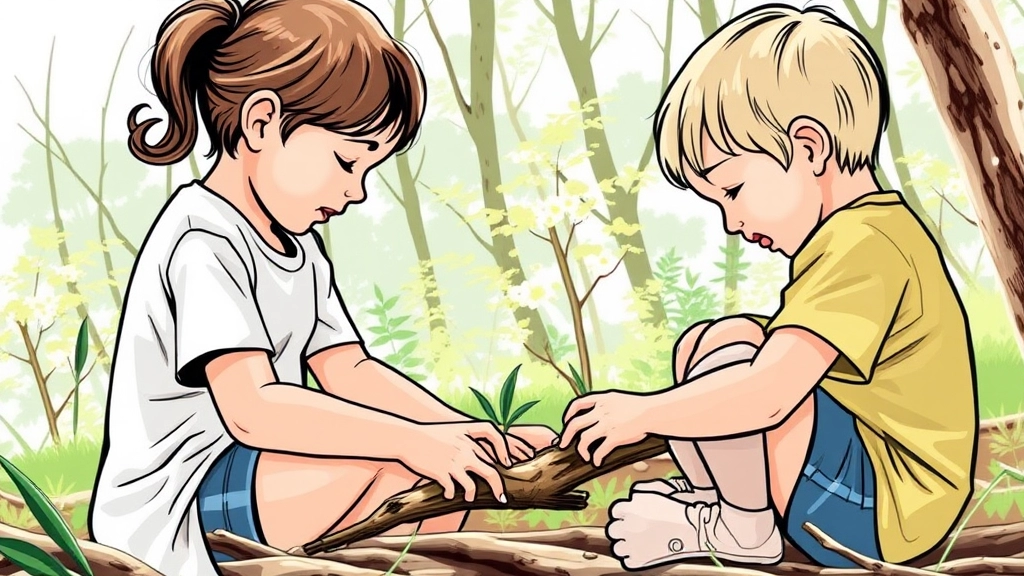
Ever wondered how to keep kids engaged in nature?
Worried they might get bored or miss out on learning?
Let’s dive into some nature exploration and learning activities that are both fun and educational.
Why Nature Exploration?
Nature exploration is key for kids.
It gets them away from screens and into the great outdoors.
Plus, they learn a ton without even realising it.
What Can We Do?
Here’s a list of easy activities:
- Scavenger Hunts: Create a list of natural items for them to find. Think leaves, rocks, and bugs.
- Bird Watching: Grab some binoculars and a bird guide. See who can spot the most species.
- Nature Journals: Give them notebooks to sketch and write about what they see. It’s like a diary, but for nature.
- Tree Identification: Teach them to recognise different types of trees. Use leaves, bark, and even the shape of the tree.
- Bug Safaris: Go on a hunt for insects. Use magnifying glasses to get a closer look.
Real Life Example
Remember that time when we took the kids on a bug safari?
They were so excited to find a praying mantis.
They even named it “Manny”.
What Do They Learn?
- Observation Skills: They start noticing details they usually miss.
- Patience: Nature doesn’t rush, and neither should they.
- Respect for the Environment: They learn to appreciate and take care of nature.
Making It Engaging
Keep it interactive.
Ask questions like, “What do you think this bug eats?” or “Why do you think this tree is so tall?”
Internal Linking
For more on outdoor activities, check out our section on Outdoor Adventure Activities.
DIY Science Experiments and Workshops
Ever wondered how to get kids excited about science without them feeling like they’re stuck in a classroom? DIY science experiments and workshops at camp are the answer. These hands-on activities turn learning into an adventure, making science not just educational but downright fun. Let’s dive into how you can make this happen.
Why DIY Science Experiments?
Kids are naturally curious. They want to know how things work, why they happen, and what they can do with the knowledge. DIY science experiments tap into this curiosity and transform it into a learning experience. Plus, they offer a break from the usual camp activities, keeping things fresh and engaging.
Setting Up Your Science Workshop
Materials Needed:
- Basic lab equipment (test tubes, beakers, etc.)
- Everyday items (baking soda, vinegar, food colouring)
- Safety gear (goggles, gloves)
- Instruction sheets or a knowledgeable guide
Steps:
- Choose Experiments: Pick experiments that are safe, simple, and visually impressive. Think volcano eruptions, slime making, or simple circuits.
- Prepare Your Space: Ensure you have a clean, safe area to work in. Outdoors is ideal for messy experiments.
- Gather Materials: Make sure you have everything you need before starting. Nothing kills excitement like missing ingredients.
- Safety First: Equip kids with safety gear and explain the importance of safety rules.
Popular DIY Science Experiments
1. Volcano Eruption:
- Materials: Baking soda, vinegar, food colouring, a small container.
- Steps: Fill the container with baking soda, add food colouring, and pour in vinegar. Watch the eruption!
2. Slime Making:
- Materials: Glue, borax solution, food colouring.
- Steps: Mix glue with water and food colouring. In a separate bowl, mix borax with water. Combine the two mixtures and knead until it turns into slime.
3. Simple Circuits:
- Materials: Battery, wires, small light bulb.
- Steps: Connect the battery to the light bulb using wires. Explain how electricity flows and lights up the bulb.
Benefits of Science Workshops
1. Hands-On Learning: Kids learn better when they can see and touch what they’re studying.
2. Encourages Curiosity: Science workshops answer the “why” and “how” questions kids constantly ask.
3. Teamwork: Many experiments require kids to work together, fostering teamwork and communication skills.
4. Fun Factor: Let’s face it, making slime or causing a mini-explosion is just plain fun.
Real Stories from the Campfire
Last summer, we had a group of kids who were initially more interested in sports than science. But once we started our DIY science workshop, they were hooked. They couldn’t get enough of the slime-making session, and by the end of the week, they were asking for more experiments. Seeing their faces light up with each discovery was priceless.
Campfire Stories and Songs
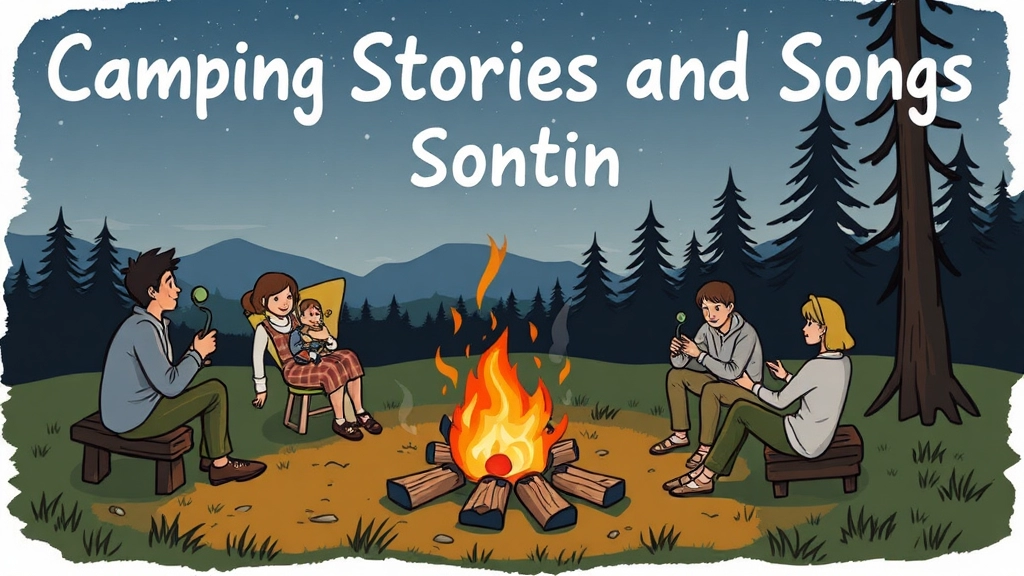
Ever wondered how to make campfire nights unforgettable?
You’re in the right place.
Campfire stories and songs can turn an average night into a magical experience.
Why do we even bother with campfire stories and songs?
Because they’re the glue that bonds everyone together.
Let’s dive in.
The Power of a Good Story
A good story can transport you to another world.
It’s not just about entertainment.
It’s about connection.
Here’s how to nail it:
- Start with a Hook: Grab their attention from the get-go.
- Build Suspense: Keep them on the edge of their seats.
- Relate to Your Audience: Make it personal and relevant.
Example:
Remember the time when we got lost in the woods and found that hidden waterfall?
That’s the kind of story that sticks.
Singing Around the Campfire
Songs are the heartbeat of campfire nights.
They’re simple.
They’re fun.
And they bring everyone together.
Here’s how to make it work:
- Choose Popular Songs: Go for songs everyone knows.
- Keep It Simple: Easy lyrics and melodies are key.
- Get Everyone Involved: Encourage participation.
Tip:
Camp classics like “Kumbaya” or “Country Roads” never fail.
Mixing Stories and Songs
Why not combine the two?
You tell a story, then break into a song that ties in.
It’s like creating a mini-show.
Example:
Tell a spooky ghost story, then sing a haunting melody.
It’s all about creating a vibe.
Sports and Physical Activities
Alright, let’s get real for a sec. How many times have you heard, “I don’t like sports” or “I’m just not good at physical activities”? Yeah, way too many. But here’s the kicker: sports and physical activities at camp are a game-changer. They’re not just about sweating buckets or scoring goals; they’re about building confidence, teamwork, and a whole lot of fun.
Why Sports and Physical Activities Matter
First off, let’s tackle the elephant in the room: Why should we even bother with sports? Here’s the lowdown:
- Boosts Confidence: Whether it’s scoring a goal or just participating, kids gain confidence.
- Teamwork Skills: Sports teach the importance of working together.
- Physical Health: Keeps the body fit and healthy.
- Mental Health: Physical activity reduces stress and anxiety.
Types of Sports and Physical Activities at Camp
Now, you might be wondering, “What kind of sports and physical activities are we talking about?” Here’s a quick rundown:
- Traditional Sports:
- Football
- Basketball
- Volleyball
- Tennis
- Adventure Sports:
- Rock Climbing
- Zip Lining
- Obstacle Courses
- Water Sports:
- Swimming
- Kayaking
- Paddle Boarding
- Fitness Activities:
- Yoga
- Pilates
- Aerobics
Making Sports Fun and Inclusive
One of the biggest worries for parents and kids alike is the fear of being left out or not being good enough. Here’s how we tackle that:
- Mixed Skill Levels: We mix skill levels so everyone feels included.
- Non-Competitive Options: Not everyone is into competition. We offer non-competitive activities too.
- Encouragement Over Criticism: The focus is on improvement and participation, not just winning.
Real Stories, Real Impact
Let me share a quick story. Last summer, we had a camper named Jamie. Jamie was never into sports and always felt left out. But then, Jamie discovered archery. It wasn’t about being the best; it was about finding something he loved. By the end of camp, Jamie was the go-to person for archery tips, and his confidence was through the roof.
Tips for Getting the Most Out of Sports and Physical Activities
Here are some quick tips to ensure everyone gets the most out of their sports experience:
- Try Everything: Encourage kids to try different sports. You never know what might click.
- Stay Hydrated: Always have water on hand.
- Warm Up and Cool Down: Prevent injuries with proper warm-ups and cool-downs.
- Listen to Your Body: It’s okay to take breaks and rest when needed.
Cultural and Educational Workshops
Ever wondered how you can make learning fun at camp?
Yeah, me too.
Cultural and educational workshops are the answer.
These sessions are all about mixing education with a good time.
No boring lectures, just engaging activities.
Why Cultural and Educational Workshops?
Kids are curious.
They want to know about different cultures, histories, and skills.
But let’s be realâtraditional classroom settings can be a snooze fest.
Here, we spice things up.
We make learning interactive and hands-on.
What Can You Expect?
Cultural Immersion Activities
- Cooking Classes: Learn to make dishes from around the world.
- Dance Workshops: Try out traditional dances from different cultures.
- Language Lessons: Pick up basic phrases in new languages.
History and Heritage
- Storytelling Sessions: Hear tales from various cultures.
- Historical Reenactments: Act out important events.
- Artifact Exploration: Handle replicas of historical items.
Life Skills and Personal Development
- Public Speaking: Boost confidence with fun exercises.
- Financial Literacy: Learn budgeting basics.
- First Aid Training: Essential skills, made simple.
Real Stories, Real Impact
Remember that kid who hated history?
After a week of our workshops, he was the one leading a historical reenactment.
Or the shy girl who wouldn’t speak up?
She nailed her first public speech.
These workshops change lives.
How to Get Started
- Survey Interests: Find out what excites your campers.
- Plan Ahead: Schedule a mix of activities.
- Gather Resources: Books, materials, guest speakersâget them all.
For more ideas on how to make your camp engaging and educational, check out our Summer Camp Schedule Activities and Themes Guide. And if you’re looking for a comprehensive list of fun activities, don’t miss our Explore Fun Activities at Summer Camp page.
FAQs: Summer Camp Ideas and Activities
What are some popular outdoor adventure activities for kids?
Popular outdoor adventure activities include nature scavenger hunts, hiking, obstacle courses, camping trips, orienteering, rock climbing, canoeing or kayaking, and zip lining.
Why are outdoor activities important for kids?
Outdoor activities are important because they promote physical health, reduce stress, and enhance social skills through teamwork and communication.
How can I ensure safety during outdoor activities?
To ensure safety, always supervise activities, use proper gear, and be familiar with the area where the activities are taking place.
What are some effective team-building games for kids?
Effective team-building games include the Human Knot, Trust Fall, and Scavenger Hunts. These activities help kids develop communication, trust, and problem-solving skills.
How do team-building activities benefit kids?
Team-building activities benefit kids by teaching them to communicate effectively, trust each other, and solve problems together, all while having fun.
What are some engaging nature exploration activities?
Engaging nature exploration activities include scavenger hunts, bird watching, keeping nature journals, tree identification, and bug safaris.
What do kids learn from nature exploration activities?
Kids learn observation skills, patience, and respect for the environment through nature exploration activities.
How can I make campfire nights memorable?
To make campfire nights memorable, incorporate engaging stories with a good hook and suspense, and sing popular, simple songs that everyone can join in on.
What are some tips for telling a good campfire story?
Start with a hook to grab attention, build suspense to keep everyone engaged, and make the story relatable to your audience.
What are some classic campfire songs?
Classic campfire songs include “Kumbaya” and “Country Roads.” These songs are simple, fun, and encourage participation.
Can I combine stories and songs during campfire nights?
Yes, combining stories and songs can create a mini-show experience. For example, tell a spooky ghost story followed by a haunting melody to set the mood.
References
-
The importance of getting kids outside – Harvard Health Blog
-
The Benefits of Outdoor Play for Children – Verywell Family
-
10 Reasons Why Kids Need to Spend Time in Nature – American Forests

